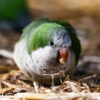- How Long Does A Quaker Parrot Live? - 17 May 2024
- 4 Hacks on Keeping Your Home Clean With Pets - 28 March 2024
- 5 Things to Know Before Bringing Home a New Kitten - 26 March 2024
We all know it would be frustrating to discover a bird trapped in your chimney. The confined space of a chimney can cause many challenges for birds, such as exhaustion, injury, or death. In this blog, we will understand the potential risks and take appropriate action, which is essential for the bird’s well-being. We will discuss the impact of bird survival when stuck in a chimney and provide guidance on handling such situations with care and love.
Reason of Birds Fly and Settling Into A Chimney
Birds may fly and settle into a chimney for various reasons, although unintentional. Here are some of the common reasons why birds may end up in chimneys:
Nesting
Chimneys seem to be secure and sheltered locations for builds to build their nests. We used to see birds such as chimney swifts or sparrows may find a chimney suitable spot to lay eggs and raise their young.
Warmth
During colder months, birds may seek warmth and shelter in chimneys. The rising heat from a fireplace or heating system can give them relief.
Accidentally Flying Path
Birds in flight can somehow take the accidently route to the chimney, especially if chimneys don’t have a protective cap or mesh screen.
Exploration
Some birds are naturally curious and explore various structures, including chimneys, as part of their foraging.
What Problems Can Arise From A Bird Flying Into A Chimney?
When a bird flies into a chimney, it increases the risk of getting stuck and dying inside, creating bad odors and fly issues within the room. Problems can arise from birds building their nests inside the chimney, including blockages occurring if the nest has broken and fallen if the nest is too vast.

There are chances that the nest can catch fire inside the chimney, which quickly becomes a very serious and out-of-control situation in the home. Birds can carry harmful bacteria, and dying within your chimney will increase the chance of maggots spreading throughout the chimney.
Damp is the main problem due to condensation build-up and lack of ventilation. It can cause mold growth, which is harmful to your health.
What To Do If A Bird Has Got Stuck In Your Chimney?
Call professionals, such as certified chimney sweep or animal rescue experts, to help you when you discover a bird stuck in the chimney. If no professional is getting you for help, you should do rescue independently.
Clear away all the debris from the chimney to reach the bird and possibly remove any coverings within the chimney. Always wear protective clothing, gloves, and face masks to prevent soot and debris. Avoid lighting a fire to try and coax the bird out of the chimney because it will kill the stuck bird.
Can Birds Die Instantly From Dehydration In A Chimney?
All animals need more water than food, and birds will die in your chimney sooner. It only takes two or three days for most small to mid-sized birds to pass away without drinking. The process isn’t instant, and you may hear them fighting for their lives to fly away for hours. Smaller birds who were already thirsty will weaken after a couple of hours.
Is There Any Chances Of A Bird To Die From Starvation In A Chimney?
It depends on birds dying from starvation in chimneys due to several factors. Birds can survive for varying durations without food. Some birds have high metabolic rates and may require more frequent meals.
Some species may experience the effects of starvation more quickly if they cannot find food. It’s essential to note that insects within the chimney can sometimes provide a limited food source for trapped birds. If you suspect a bird is trapped in a chimney, it’s essential to take prompt action to ensure its release and well-being. Seeking assistance from a chimney sweep is recommended to remove the bird safely.

Will A Bird Who Has Died In The Chimney Produce A Smell?
Yes, if a bird dies in the chimney, it can produce a smell as the carcass decomposes.Depending on the chimney’s temperature and ventilation, the odor can be unpleasant and may become noticeable within a few days to a couple of weeks.There are humidity factors as well, and airflow can impact the decomposition rate.
Smell results from the bird’s body tissues causing bacteria and other decomposers. As the decomposition process progresses, gasses are released and contribute to odor. It is essential to address the situation quickly to remove the bird and eliminate potential pest issues.
How to Keep Birds Out Of Chimney?
There are some measures that you people can take to prevent birds from entering the chimney:
Install a Chimney Cap
It’s an effective barrier that covers the chimney opening while allowing smoke and gasses to escape. The cap should have a mesh screen or wire grid with small openings to prevent birds from entering. Ensure the cap is securely fastened to avoid being dislodged by strong winds or bird activity.
Repair Damaged Chimney Structures
Always watch the chimney for cracks, gaps, or other openings that birds could use to access the interior. Repair and seal these openings to eliminate potential entry points.
Trim Nearby Tree Branches
You should trim nearby tree branches that hang close because birds can use these branches as a perch or launching point to enter the chimney. Always keep the branches away from the chimney.
Install Bird Deterrents
Various types of bird deterrents can keep birds away from chimneys. These deterrents, such as reflective objects or bird spikes, are installed on nearby surfaces.
Regular Maintenance
Always schedule regular chimney inspections and cleanings to remove existing nests, debris, or other attractants that could enter the chimney. A clean and well-maintained chimney won’t attract the nesting birds.
Final Thoughts
These detailed aspects let you know where birds can die inside their chimneys. It could take a longer time without any professional help. These tips should be appropriately considered to avoid such a situation.
















